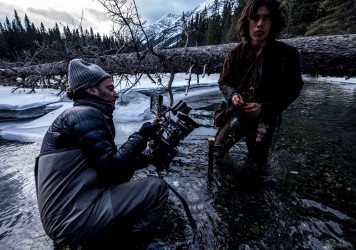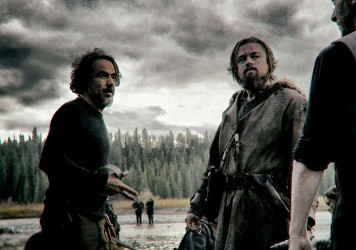Michael Keaton soars in director Alejandro González Iñárritu’s triumphant return to form.
Since his 2000 debut, Amores Perros, Alejandro González Iñárritu has, for better or worse, explored the deepest, darkest recesses of the human condition – dog fighting in Mexico City, marital strife in Morocco, tragedy in the basement sweat shops of Barcelona – as a means to better understand (or, more likely, attempt to keep a handle on) the ever-shifting paradigm of 21st century living. In doing so, he has experimented with an array of structures and techniques, from the handheld immediacy of 21 Grams, to Babel’s multi-stranded narrative framework. Birdman or (The Unexpected Virtue of Ignorance) – to give the film its full title – is unquestionably his most innovative and uncompromising work.
Much of the early buzz surrounding the film centred on a long-since debunked rumour that it had been shot in a single take. Instead, Iñárritu, along with cinematographer Emmanuel Lubezki and editor Douglas Crise, has constructed the film in such a way that it feels like one continuous shot. Superficially, this means there are no cuts – the rhythm is set by an occasionally incidental free jazz soundtrack, while timeframe jumps are marked with time-lapse shots. Like laying out the pieces of Hitchcock’s Rope, however, there’s nothing to really be gained from working out precisely how this brilliant effect was achieved. So let’s just chalk it up as a triumph of digital filmmaking and move on.
Thematically, the film Birdman most closely resembles from Iñárritu’s oeuvre is his difficult 2010 drama Biutiful, which saw Javier Bardem play a similarly flawed superhero-of-sorts with extraordinary and unexplained supernatural abilities. Here the Mexican writer/director finds Michael Keaton in hair-raisingly good form as a souped-up, more grotesque and surprisingly sympathetic version of that character.
Riggan Thompson is a middle-aged actor who, 20 years since the last instalment of the ’90s superhero franchise that made him famous, is starting to realise every actor’s worst fear: that he has fallen out of public favour. With one last roll of the dice, he has chosen to write, direct and star in a Broadway adaptation of the Raymond Carver short story ‘What We Talk About When We Talk About Love’ – the in-joke for anyone who’s read it being that no-one in their right mind would think to repurpose it for the stage.
When Thompson loses his co-lead just days before opening night, he finds himself staring at the ignominy of having to cancel the entire production. His producer (a game Zach Galifianakis) is glibly pessimistic about finding a worthy replacement at the eleventh hour – Fassbender’s shooting the new X-Men movie; Downey Jr’s doing another Iron Man – but another co-star, played by Naomi Watts, has what seems like the perfect solution. Enter Mike Shiner (Edward Norton), a cocky method man whose intense on-stage alpha persona amusingly conflicts with his off-stage flaccidity. Quite clearly he is not the answer to this particular problem.
Compounding Thompson’s mania are his ex-wife (Amy Ryan) and current squeeze (Andrea Riseborough), one a cruel reminder of the past he wasted, the other a long-suffering symbol of the future he doesn’t want. Then there’s fresh-from-rehab daughter, Sam (Emma Stone), or the girl with the feather tattoo, always present yet emotionally distant. Thompson’s worst enemy, however, is himself.
Having never managed to step out of the shadow of his iconic superhero alter-ego, he now exists as the man who “used to be Birdman.” Crippled by narcissism and consumed by his need to be adored, it’s painful to see this once prominent A-lister desperately trying to fathom why he’s no longer relevant. To the rest of us, of course, it’s no wonder he’s been forgotten. As Sam points out during a vitriolic tirade, he isn’t even on Twitter.
This is where Iñárritu’s message – as well as his choice of text-within-the-title – begins to crystallise. For as much as his film gleefully takes aim at acting, celebrity, blockbuster propaganda, social media and the saturation of the public sphere – and, with added relish, critics – Birdman is not as inherently cynical as it may initially appear. The most acerbic, pseudo-philosophical and quotable lines from the script, which are hogged by Norton and Galifianakis, feel infinitesimal when put next to a simple, passing remark from Thompson: “truth is always interesting”.
Fundamentally, this is a film that boldly challenges the idea that love is a human right, a notion we have all been conditioned to believe. Through Thompson and the people who orbit him, we are told not only that love cannot be bought, but that some of us simply don’t deserve to be loved. If this sounds like the kind of sobering epiphany Iñárritu has reached for (and sometimes failed to grasp) before, it’s rendered less idealistic through the film’s darkly comic tone. In one scene, Naomi Watts’ character breaks down in her dressing room. Sobbing uncontrollably and spattered in blood, she reveals that all she ever wanted was for someone to tell her she made it. The characters in Birdman don’t always find redemption, but Iñárritu’s faith in people has never felt more real.
Published 1 Jan 2015
Iñárritu! Lubezki! Keaton! Norton! Stone!
A wickedly subversive, riotously funny intertextual psycho-odyssey.
Doesn’t so much play fast-and-loose with cinematic convention as spit directly in its face.

Leonardo DiCaprio feels the wrath of man in Alejandro González Iñárritu’s awesomely violent revenge western.

The Revenant marks yet another mesmerising high point in the career of Alejandro González Iñárritu’s most trusted collaborator.

The Revenant director offers a personal and profound response to one of life’s biggest questions.